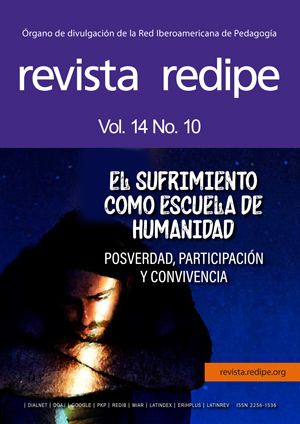The value of suffering
Main Article Content
Keywords
Suffering, Transcendence, Responsibility, Anthropology, Ethics
Abstract
The author addresses the problem of suffering from a rational perspective, based on the anthropology and ethics of E. Levinas. He takes a journey through the Hebrew and Christian traditions, highlighting the influence that these traditions have had on Western society. For the author, suffering is an inherent component of human existence, of the circumstances in which all existence is woven and realised. Transcendence, stepping outside of oneself to take care of others, the need to be responsible for others, is part of the radical structure of human existence and the necessary path to “saving” suffering. Suffering finds its “salvific” meaning and is justified if it liberates others in their situation of need.
References
Adorno, Th. W. (1998) Educación para la emancipación (Madrid, Morata).
Adorno, Th. W. (2001) Minima moralia (Madrid, Taurus), 3ª edic.
Chalier, C. (1995) Levinas. La utopía de lo humano (Madrid, Riopiedras).
Duch, Ll. (2004) Estaciones del laberinto (Barcelona, Herder).
García Cordero, M. (2010) Biblia comentada. Pentateuco I. (Madrid, B. A. C.).
González-Arnáiz, G. (2021) Ética y responsabilidad (Madrid, Tecnos).
Horkheimer, M. y Adorno, Th. W. (1994) Dialéctica de la Ilustración (Madrid, Trotta).
Levinas, E. (2002) Totalidad e infinito (Salamanca, Sígueme), 6ª edic.
Levinas, E. (2011) De otro modo que ser o más allá de la esencia (Salamanca, Sígueme).
Levinas, E. (2013) Escritos inéditos. I. (Madrid, Trotta).
Levinas, E. (2015) Ética e infinito (Madrid, Machado).
Levinas, E. (2014) Alteridad y trascendencia (Madrid, Arenalibros).
Levinas, E. (1993) Entre-nosotros (Valencia, Pretextos).
Levinas, E. (2019) Dios, la muerte y el tiempo (Madrid, Cátedra), 9ª edic.
Mate, R. (2011) Tratado de la injusticia (Barcelona, Antrhopos).
Mate, R. (2018) El tiempo, tribunal de la historia (Madrid, Trotta).
Mêlich, J. C. (1998) Totalitarismo y fecundidad (Barcelona, Anthropos).
Mêlich, J. C. (2010) Ética de la compasión (Barcelona, Herder).
Mêlich, J. C. (2021) La fragilidad del mundo (Barcelona, Tusquets).
Mêlich, J. C. (2016) Lógica de la crueldad (Barcelona, Herder), 2ª impres.
Montero, J. L. (2025) Un viejo debate a la luz del siglo XXI, Reseña Bíblica, n.º 127, pp. 11-21.
Morla, V. (2017) Libro de Job. Recóndita armonía (Estella-Navarra, Verbo Divino).
Ortega y Gasset, J. (1975) La historia como sistema (Madrid, Revista de Occidente), 7ª edic.
Ortega y Gasset, J. (1990) Meditaciones del Quijote (Madrid, Alianza).
Ortega y Gasset, J. (1977) Ideas y creencias (Madrid, Revista de Occidente), 11ª edic.
Ortega, P. y Romero, E. (2019) A la intemperie (Barcelona, Octaedro).
Ortega, P. (2006) Sentimientos y moral en Horkheimer, Adorno y Levinas, Revista Española de Pedagogía, 235, pp. 503-524.
Ortega, P. (2004) La educación moral como pedagogía de la alteridad, Revista Española de Pedagogía, 227, pp. 5-30.
Ortega, P. (2013) La pedagogía de la alteridad como paradigma de la educación intercultural, Revista Española de Pedagogía, 226, pp. 401-422.
Ortega, P. (2016) La ética de la compasión en la pedagogía de la alteridad, Revista Española de Pedagogía, 264, pp. 243- 264.
Ortega, P. (2025) Pedagogía de la alteridad: Levinas y la educación (Universidad de Murcia, Editum-Redipe).
Pintado, O. (2024) Emmanuel Levinas. Pensar lo impensable (Madrid, Ciudad Nueva).
Pintor-Ramos, A. (2011) Introducción a la edición castellana, en: Emmanuel Levinas, De otro modo que ser o más allá de la esencia (Salamanca, Sígueme).
Rosa, H. (2019) Resonancia (Madrid, Katz).
Schopenhauer, A. (1993) Los dos problemas fundamentales de la ética (Madrid, Siglo XXI).
Zamora, J. A. (2004) Th. W. Adorno. Pensar contra la barbarie (Madrid, Trotta).
Zubiri, X. (1980) Inteligencia sentiente (Barcelona, Planeta).



